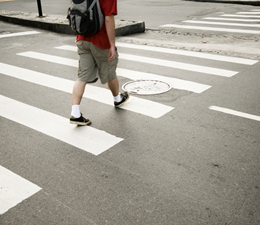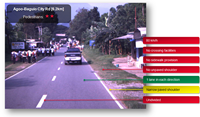
Feb 28, 2014 | Espanol news
Un viaje a la hermosa ‘Ciudad de los Pinos’ está por volverse más seguro gracias a las mejoras en seguridad vial que tiene planeado realizar el DPWH.
El camino que sube hasta la cima de la montaña es uno de los más pintorescos de la nación, pero también es escenario de numerosas colisiones viales graves. En julio de 2010, por ejemplo, la policía reportó que al menos 12 personas murieron y otras 39 resultaron heridas después de que el bus en el que viajaban colisionara contra un árbol en una curva.
Las mejoras planificadas incluyen límites de velocidad en zonas escolares, bermas pavimentadas, barreras de seguridad, veredas (aceras), cruces peatonales y nuevas demarcaciones y señales.
El proyecto de demostración es un resultado tangible de las evaluaciones del iRAP que se llevaron a cabo con el apoyo del Banco Mundial y Australian Aid.
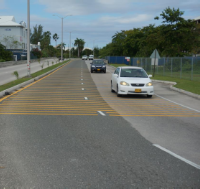
Feb 28, 2014 | Espanol news
La National Roads Authority (Autoridad Nacional de Vías) de las Islas Caimanes ha iniciado un programa de evaluaciones de iRAP que conducirá a mejoras en la seguridad vial.
El plan de la NRA expone detalles para las evaluaciones de las vías existentes, evaluaciones de diseños para una vía que conecta el aeropuerto, implementación de contramedidas de seguridad vial, capacitación, desarrollo de políticas viales.
En su discurso durante el lanzamiento oficial de la iniciativa, el ministro responsable de las vías, Kurt Tibbetts, sostuvo que las evaluaciones eran necesarias por la preocupación que existe respecto a las colisiones mortales que han ocurrido. En 2011, las Islas Caimanes tuvieron una tasa de muertes en las vías de 16.5 muertes por 100,000 personas, casi el doble del promedio de los países de altos ingresos.

Feb 28, 2014 | News
The National Roads Authority of the Cayman Islands has begun a program of iRAP assessments that will lead to road safety improvements.
The NRA plan sets out details for assessments of existing roads, assessments of designs for a planned airport connector road, implementation of road safety countermeasures, training, policy development and advocacy.
Speaking at an official launch of the initiative, the minister responsible for roads, Kurt Tibbetts, said that the assessments were needed out of concern for fatal crashes that have occurred. In 2011, the Cayman Islands had a road death rate of 16.5 deaths per 100,000 people, almost twice the average of high-income countries.

Feb 28, 2014 | Espanol news
Se vienen realizando inspecciones de seguridad vial de 3,300 km de vías en Egipto.
La fase de recolección de datos de las inspecciones fue realizada por empresas acreditadas por iRAP, IRSM y ARRB Group, usando equipos especializados enviados desde Australia.
El personal de GARBLT pronto iniciará la capacitación sobre la siguiente fase de las inspecciones viales. Esta fase es conocida como ‘codificación’ e implica el uso de videos de recolección de datos (reconocimiento) de las vías para desglosar más de 50 atributos de las vías, para cada segmento de 100 metros de vía.
El proyecto es parte de los esfuerzos por reducir las 10,000 muertes en las vías que se estima ocurren cada año.
La participación de iRAP en el proyecto cuenta con el apoyo de GRSF y Bloomberg Philanthropies.

Feb 28, 2014 | News
New iRAP assessments are due to begin shortly in the Indian State of Uttar Pradesh, linked with the World Bank-financed road upgrades.
Uttar Pradesh is home to the famed Taj Mahal, but among the States of India Uttar Pradesh also suffers the second highest level of road trauma, with a reported 16,149 deaths occurring in 2012.
The assessments of some 2,000km of roads will build on the extensive work already undertaken in India, which includes assessments of 6,200km of existing roads and 1,800km of designs for major road upgrades.
iRAP’s participation in the project is supported by the GRSF and Bloomberg Philanthropies.

Feb 28, 2014 | Espanol news
Dentro de poco se iniciarán nuevas evaluaciones del iRAP en el estado indio de Uttar Pradesh, vinculadas con las mejoras a las vías financiadas por el Banco Mundial.
Uttar Pradesh alberga el famoso Taj Mahal, pero de los estados de la India, es Uttar Pradesh el que presenta el segundo nivel más alto de traumatismos viales, con 16,149 muertes reportadas que ocurrieron en 2012.
Las evaluaciones de cerca de 2,000 km de vías se basarán en el extenso trabajo ya realizado en la India, que incluye evaluaciones de 6,200 km de vías existentes y 1,800 km de diseños para mejoras importantes en las vías.
La participación de iRAP en el proyecto cuenta con el apoyo de GRSF y Bloomberg Philanthropies.

Feb 27, 2014 | News
More than 100 road engineers from across Mexico are currently participating in safety training courses.
The training program, organized by SCT and delivered by iRAP, focuses on road engineering safety principles and techniques, the iRAP methodology and use of the iRAP software and data.
The courses complement the extensive iRAP assessments in Mexico, covering some 45,000km of national roads and 20,000km of secondary roads, and are part of efforts to systematically reduce risk across the network.
SEMIC, an accredited iRAP supplier, is assisting in delivery of the national training program.

Feb 27, 2014 | Espanol news
Más de 100 ingenieros viales de todo México están actualmente participando en cursos de capacitación en seguridad vial.
El programa de capacitación, organizado por SCT y dictado por iRAP, se centra en los principios y técnicas de seguridad de la ingeniería vial, la metodología del iRAP y el uso del software y datos de iRAP.
El curso complementa las extensas evaluaciones de iRAP en México, que cubren cerca de 45,000 km de vías nacionales y 20,000 km de vías secundarias, y son parte de los esfuerzos por reducir sistemáticamente el riesgo en toda la red.
SEMIC, un proveedor acreditado del iRAP, está ayudando en el dictado del programa de capacitación nacional.
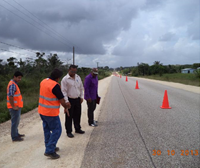
Feb 27, 2014 | Espanol news
Se vienen realizando mejoras para elevar las Clasificaciones por Estrellas de la seguridad vial en la vía entre la Ciudad de Belice y Belmopán.
Las mejoras incluyen bermas pavimentadas, señales de reglamentación y de advertencia, áreas de descanso para autobuses, barreras de seguridad, demarcaciones de líneas y tachas reflectantes, cruces peatonales y señales de flecha direccional de alta visibilidad en las curvas.
El proyecto, liderado por el Ministerio de Obras Públicas (MOW, por su sigla en inglés) con el apoyo financiero del Banco de Desarrollo del Caribe (BDC), está contribuyendo a construir una cultura de sguridad vial en Belice. Las mejoras en las vías son acompañadas de apoyo institucional, desarrollo de estrategias, capacitación y medidas de cumplimiento de la ley, e incluirá el monitoreo de las Clasificaciones por Estrellas y los resultados de seguridad.
Además, se están diseñando mejoras de seguridad en un segundo tramo de la vía. Dichas obras incluyen una nueva rotonda, elementos de pacificación del tránsito y ciclovías y aceras (veredas) en Belmopán.

Feb 27, 2014 | News
Upgrades to lift road safety Star Ratings on the road between Belize City and Belmopan are underway.
The improvements include paved shoulders, regulatory and warning signs, bus laybys, safety barriers, linemarking and reflectorized road studs, pedestrian crossings and high-visibility chevron signs at curves.
The project is led by the Ministry of Public Works (MOW) with financial support from the Caribbean Development Bank (CDB) and is helping to build a culture of road safety in Belize. The road upgrades are accompanied by institutional support, strategy development, training and police enforcement, and will include monitoring of Star Ratings and safety outcomes.
In addition, safety improvements on a second stretch of road are now being designed. Those works include a new roundabout, traffic calming, and bike lanes and sidewalks in Belmopan.

Feb 27, 2014 | News
The next iRAP Asia Pacific Workshop will be held on 25 June, 2014 in Manila, Philippines.
The workshop is part of “Asia Pacific Road Safety 2014”, an event being organized by the Asian Development Bank (ADB), Global Road Safety Partnership (GRSP), International Road Assessment Programme (iRAP) and Global New Car Assessment Programme (GNCAP).
This comprehensive seminar, workshop and training programme will be conducted at the ADB headquarters in Manila, Philippines from 23 June to 4 July 2014. There will be four key events:
- GRSP Asia Seminar (23-24 June)
- iRAP Asia Pacific Workshop (25 June)
- ADB/ASEAN Train the Trainer Programme (invitation only)
- GNCAP Workshop (invitation only).
Registration for these events is now open.

Feb 27, 2014 | Espanol news
El siguiente Taller de iRAP Asia Pacífico se llevará a cabo el 25 de junio de 2015 en Manila, Filipinas.
El taller es parte de “Asia Pacific Road Safety 2014” (Seguridad Vial en Asia Pacífico 2014), un evento que está siendo organizado por el Banco Asiático de Desarrollo (BAsD), la Global Road Safety Partnership (GRSP), el International Road Assessment Programme (iRAP) y el Global New Car Assessment Programme (GNCAP).
Este seminario, taller y programa de capacitación exhaustivo se realizará en la sede del BAsD en Manila, Filipinas del 23 de junio al 4 de julio de 2014. Habrán 4 eventos clave:
- Seminario de GRSP Asia (23-24 de junio)
- aller del iRAP Asia Pacífico (25 de junio)
- Programa de Capacitar al Capacitador del BAsD/ASEAN (solo con invitación).
- Taller del GNCAP (solo con invitación).
Ya se encuentra abierta la inscripción para estos eventos.
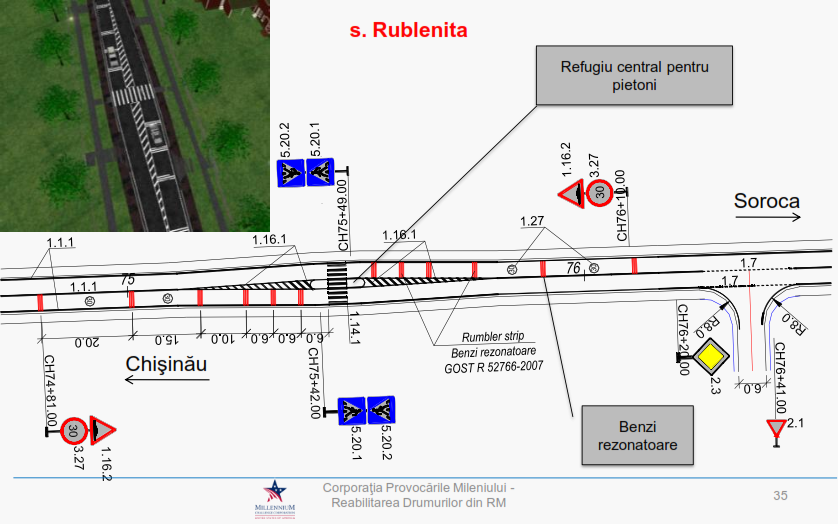
Feb 17, 2014 | Assessments
Apart from assessing existing roads, Star Ratings are being used to ensure that safety is built-in to designs for upgrades and new roads prior to construction.
By providing a means of objectively measuring the impact on risk of various design iterations, the Star Rating design process is helping harness the potential of designers to find creative solutions to challenging safety problems.
For governments and development banks, the process opens the opportunity to set performance-based targets for vehicle occupants, motorcyclists, pedestrians and bicyclists that not only improve safety but create a high level of transparency and accountability.
The Star Rating design process has been successfully used in countries such as Moldova and India, in conjunction with existing mechanisms such as Road Safety Audits and highway design standards.
Find out more:
Feb 17, 2014 | Assessments
Governments and funding agencies can benefit from measuring and reporting on the road safety outcomes of their investments.
Star Ratings and Risk Maps provide objective measures that can be used to track road safety performance and establish policy positions.
In the United Kingdom for example, EuroRAP Risk Maps have been used to demonstrate that the government achieved a significant reduction in high-risk primary route roads between 2002 and 2011.
Find out more:
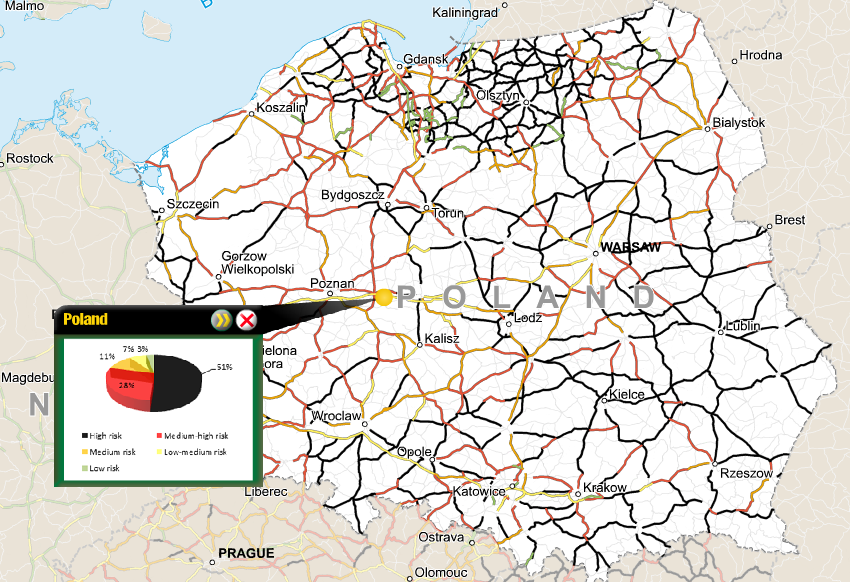
Feb 16, 2014 | Assessments
In regions where detailed crash data is available, iRAP produces Risk Maps that represent the actual number of deaths and injuries on a road network.
Risk Maps capture the combined risk arising from the interaction of road users, vehicles and the road environment. The maps provide an objective view of where people are dying and where their crash risk is greatest. This map is an example from the European Road Safety Atlas.
Feb 15, 2014 | Assessments
Using specially equipped vehicles, software and trained personnel, iRAP inspections involve detailed road surveys and data collection, focusing on more than 50 different road attributes that are known to influence the likelihood of a crash and its severity.
These attributes include intersection design, number of lanes and markings, roadside hazards, footpaths and bicycle facilities. The road inspection data underpins iRAP Star Ratings and Safer Roads Investment Plans (SRIP).
This video provides an illustration of the type of data that is collected.
Find our more:
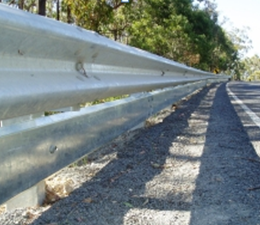
Feb 15, 2014 | Assessments
iRAP considers more than 90 proven road improvement options to generate affordable and economically sound Safer Road Investment Plans (SRIP) that improve a road’s Star Ratings and will save lives.
Here are three examples of countermeasures that have been identified for around 300km of roads in the Dominican Republic. Click on each countermeasure to view an interactive map of where they could be used and the number of deaths and serious injuries they could prevent.
Find our more:
Feb 1, 2014 | Report
Download Click the file icon above to download the file. 2014 iRAP Technical report – San Paulo (Spanish)
Feb 1, 2014 | Report, Resources
Download Click the file icon above to download the file. 2014 iRAP Technical report – San Paulo (English)
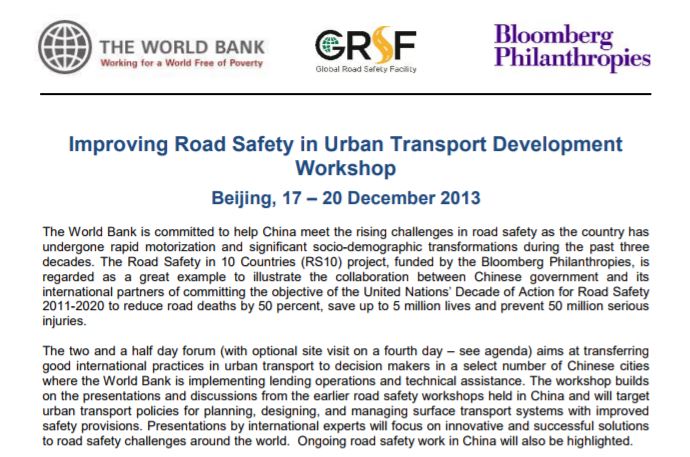
Dec 20, 2013 | Events, Improving road safety in urban transport development workshop, Presentations, Resources
This two and a half day forum aimed at transferring good international practices in urban transport to decision makers in a select number of Chinese cities and provinces where World Bank and Asian Development Bank projects are underway. Improving road safety in urban...

Dec 11, 2013 | News
The work is expected to result in the length rated 4- or 5-stars for pedestrians increasing from 9% to 84%, and a more than doubling of the length rated 3-stars or better for vehicle occupants.
Improvements to M2, which connects the Republic of Moldova and Ukraine for private, passenger and commercial traffic, are being undertaken by the Government and the Millennium Challenge Corporation (MCC). The safety features include safety barriers, intersection layout changes, and pedestrian footpaths and crossings.
The Star Ratings were performed by EuroRAP as an independent check that the investment will be coupled with an improvement in road safety performance.

Dec 11, 2013 | Espanol news
Se espera que la obra de como resultado que el tramo clasificado con 4 o 5 estrellas para peatones se incremente de 9% a 84% y que se duplique el tramo clasificado con 3 estrellas o más para ocupantes de vehículos.
El gobierno y la Corporación del Desafío del Milenio (MCC) vienen realizando mejoras a la M2, que conecta la República de Moldavia y Ucrania para el tráfico privado, comercial y de pasajeros. Los elementos de seguridad incluyen barreras de seguridad, cambios en el diseño de las intersecciones, y aceras y cruces peatonales.
Las Clasificaciones por Estrellas fueron realizadas por EuroRAP como una verificación independiente de que la inversión irá acompañada de una mejora en el desempeño de la seguridad vial.

Dec 11, 2013 | News
iRAP and International Road Federation jointly held a Safer Roads by Design for Sao Paulo seminar in Brazil, during the TranspoQuip conference.
The course covered topics such as:
- How to design a 3-star or better road in Brazil.
- An introduction to Safer Road by Design: The role of engineering measures.
- Details on designs for safer roadsides, including longitudinal barriers, terminals and transitions.
The seminar coincides with iRAP road assessments that are being undertaken in Brazil, supported by the Global Road Safety Facility and Bloomberg Philanthropies.

Dec 11, 2013 | Espanol news
iRAP y la Federación Internacional de Carreteras realizaron conjuntamente un seminario de Safer Roads by Design (Diseño de Vías Más Seguras) para Sao Paulo en Brasil, durante la conferencia de TranspoQuip.
El curso cubrió los siguientes temas:
- Cómo diseñar una vía de 3 estrellas o más en Brasil.
- Introducción a Safer Road by Design: El rol de las medidas de ingeniería.
- Detalles sobre diseños para aceras más seguras, incluyendo barreras longitudinales, terminales y transiciones.
El seminario coincide con las evaluaciones viales del iRAP que se vienen llevando a cabo en Brasil con el apoyo del Fondo Global para la Seguridad Vial y Bloomberg Philanthropies.
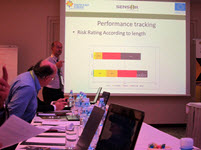
Dec 11, 2013 | Espanol news
Socios del proyecto SENSoR de 14 países junto con socios de ROSEE en Eslovenia continúan trabajando a favor de la reducción del riesgo en las vías en el Sudeste de Europa.
Una reunión informativa de alto nivel que incluyó al ministro de infraestructura de Eslovenia, Omerzel Samo, al presidente de EuroRAP, John Dawson, y a la presidenta de EASST, Emma Maclennan, se centró en el rol que desempeñan las mejoras en la infraestructura en la reducción de lesiones.
Un tema clave fue la necesidad de conectar la “mano izquierda” de la inversión en infraestructura con la “mano derecha” del gasto en la respuesta a emergencias, salud, cuidados de largo plazo y seguros.
La conferencia de mitad de periodo sobre planificación y reporte de SENSoR atrajo a 140 participantes quienes escucharon que 3,150 km de la red de Eslovenia y 3,600 km de la red TEN-T de Grecia ya habían sido inspeccionadas (haga clic aquí para ver los resultados). Se están realizando inspecciones en los otros países, así como seminarios y eventos de diseminación destinados a crear mayor conciencia pública y política de la epidemia de las lesiones en las vías.













